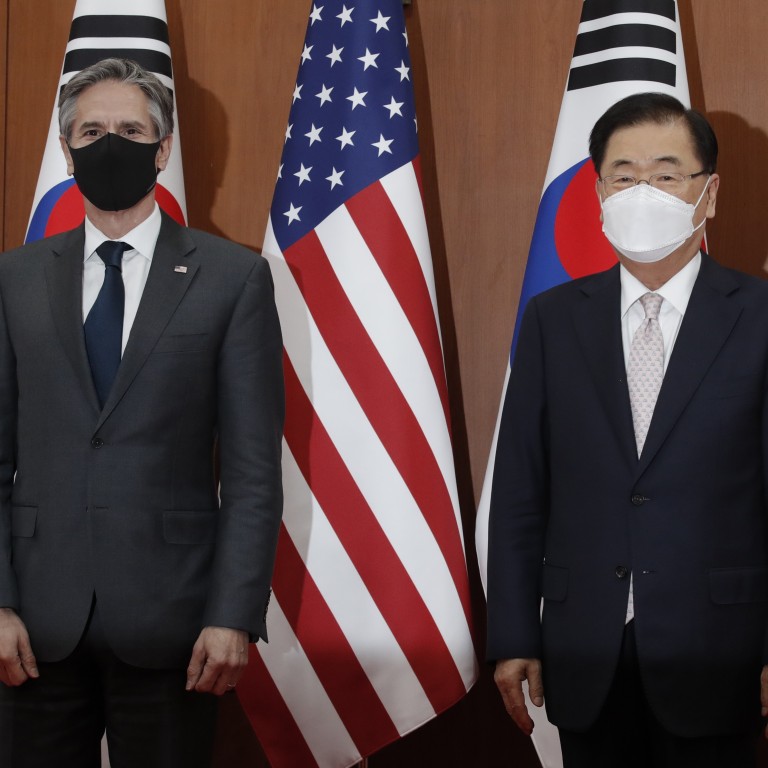
Japan, South Korea take different approaches to China relations
- East Asian neighbours highlighted their priorities in talks with senior US officials last week
- Tokyo took a harder line with Beijing, but Seoul was more conciliatory
Diplomatic observers said this reflected the different diplomatic priorities of the two East Asian nations, with China’s need for good relations with South Korea heightened as tensions with Japan rise.
A joint statement released by South Korea and the US on Thursday was more circumspect, saying the two nations opposed activities that undermined the rules-based international order, and calling for an open Indo-Pacific region. It did not identify China by name or mention Beijing’s red line issues.
The discussions between Seoul and Washington focused more on North Korea, with the joint statement saying US forces in South Korea would play a critical role in maintaining stability on the Korean peninsula and that the North Korean nuclear and ballistic missile issue was a priority for the US-South Korea alliance. In remarks at the end of the talks, Blinken called on China to put more pressure on Pyongyang to end its nuclear programme.
Frederick Kliem, a fellow at the S. Rajaratnam School of International Studies at Nanyang Technological University in Singapore, said Blinken’s trip highlighted the different priorities of Japan and South Korea.
“Japan is seriously concerned about China’s assertiveness in the Western Pacific, especially the East and South China seas. That represents a tangible security threat for Tokyo, which, as things stand, has neither the desire nor the means to balance the Chinese threat without the US. It is convenient for Japan that Washington shares that threat perception, and it is no surprise that Tokyo joins the Biden administration in their assessment of China,” he said.
“As for South Korea, from a regional perspective, the problem is that Seoul does not think regionally but confines its efforts mostly to the north of the peninsula.”
Beijing’s focus on maritime law ‘reflects rising concerns over South China Sea’
The passage of China’s coastguard law this year, which allows Chinese law enforcement vessels to conduct pre-emptive strikes against foreign ships, alarmed Tokyo, pushing it to consider sending more armed forces to the East China Sea and boost its alliance with the US.
Li Jiacheng, a research fellow with the Charhar Institute, a foreign policy think tank in Hebei province, said South Korea was more cautious in siding with the US to counter China as it did not have a territorial conflict with Beijing.
“The joint statement by the US and Japan certainly casts a shadow on China-Japan relations. I do not think the outlook for the relationship is positive. Their relationship is deteriorating on the security, economic and human rights fronts, and the confrontations in the East China Sea may get tougher,” Li said.
Sarah Teo, a research fellow at the S. Rajaratnam School of International Studies, said: “I think that South Korea’s approach towards China is shaped in large part by the fact that Seoul will need Beijing’s support in its policy towards North Korea.
Song Luzheng, an international relations researcher at Fudan University, said China had a greater need to improve relations with South Korea, mainly through economic means and playing up the territorial spat between Seoul and Tokyo over Liancourt Rocks, a series of small islands in the Sea of Japan whose control by South Korea is contested by Japan.
“At least for now, more confrontations between China and Japan are expected because of the US factor and territorial disputes, and also Japan does not want China to make too much progress,” he said.
Chinese social media users declare war on South Korean cartoon for allegedly disrespecting China
Guo Hai, an associate researcher at South China University of Technology, said the security alliance between Tokyo and the US would be strengthened and there was no way Japanese perceptions towards Beijing could be changed.
“China will need to step up ties with South Korea,” he said. “But that really depends on how many policy tools China has. Right now, other than economic and trade, China does not have many tools to use with South Korea.”
Additional reporting by Simone McCarthy


